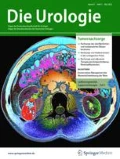Zusammenfassung
Hintergrund
Erste Erfahrungen bei der Anwendung von Abiraterone und Cabazitaxel im Rahmen der Härtefallprogramme bei Patienten mit metastasiertem kastrationsresistentem Prostatakarzinom nach Docetaxel-Chemotherapie.
Material und Methoden
In der vorliegenden Arbeit werden PSA- und bildmorphologisches Ansprechen während der ersten 3 Therapiemonate sowie Nebenwirkungsraten im klinischen Alltag beschrieben. Alle Patienten wurden innerhalb der Härtefallprogramme von Abiraterone und Cabazitaxel bzw. nach deren Ein-/und Ausschlusskriterien an der Technischen Universität München behandelt.
Ergebnisse
Von 54 Patienten wurden 15 Patienten mit Cabazitaxel und 39 Patienten mit Abiraterone behandelt. In der Cabazitaxel-Gruppe lagen nach 3 Monaten die PSA-Reduktionsrate >50% bei 46,2%, die PSA-Progressionsrate bei 15,4% und die bildmorphologische Tumorkontrollrate bei 83,3%. Die häufigsten Grad-3/4-Hämatotoxizitäten waren Neutropenie (40%) und Anämie (20%). Eine febrile Neutropenie trat bei 2 von 15 (13,3%) Patienten auf. Die häufigsten nicht-hämatologischen Toxizitäten waren Diarrhö (13,3%) und Polyneuropathie (13,3%). In der Abiraterone-Gruppe lagen nach 3 Monaten die PSA-Reduktionsrate >50% bei 35,1%, die PSA-Progressionsrate bei 46,0% und die bildmorphologische Tumorkontrollrate bei 47,1%. Die häufigsten Grad-3/4-Hämatotoxizitäten waren Anämie (5,1%) und Thrombozytopenie (5,1%). Die häufigsten nicht-hämatologischen Toxizitäten waren Fatigue (20,5%), Schweißausbrüche (17,9%) und Obstipation (10,3%).
Schlussfolgerung
Die klinischen Anwendungsdaten belegen mit den Zulassungsstudien vergleichbare Ansprechraten für Cabazitaxel und Abiraterone bei gleichzeitig vertretbarem Nebenwirkungsspektrum.
Abstract
Objective
First clinical experiences with abiraterone and cabazitaxel for the treatment of metastatic castration-resistant prostate cancer patients following docetaxel chemotherapy are reported.
Patients and methods
We describe PSA response rates and disease control rates determined by imaging studies at 3 months as well as side effects in the daily routine. All patients were treated within the“compassionate use” programs of cabazitaxel and abiraterone or treated according to their inclusion and exclusion criteria at the “Technische Universität München”.
Results
Of 54 patients, 15 were treated with cabazitaxel and 39 with abiraterone. In patients treated with cabazitaxel, after 3 months of therapy the PSA reduction rate > 50% was 46.2%, the PSA progression rate was 15.4%, and the disease control rate was 83.3%. Main grade 3/4 hematotoxicities were neutropenia (40%) and anemia (20%). Febrile neutropenia was observed in 2 of 15 (13.3%) patients. Main non-hematological grade 3/4 toxicities were diarrhea (13.3%) and polyneuropathy (13.3%). In patients treated with abiraterone, after 3 months of therapy the PSA reduction rate >50% was 35.1%, the PSA progression rate was 46.0%, and the disease control rate was 47.1%. Main grade 3/4 hematotoxicities were anemia (5.1%) and thrombocytopenia (5.1%). Main non-hematological toxicities were fatigue (20.5%), sweating (17.9%), and constipation (10.3%).
Conclusion
Utilization of cabazitaxel and abiraterone in the daily routine show response rates comparable to their approval studies with acceptable side effects.


Literatur
Danila DC, Morris MJ, de Bono JS et al (2010) Phase II multicenter study of abiraterone acetate plus prednisone therapy in patients with docetaxel-treated castration-resistant prostate cancer. J Clin Oncol 28(9):1496–1501
Bono JS, Oudard S, Ozguroglu M de et al (2011) Abiraterone and increased survival in metastatic prostate cancer. N Engl J Med 364(21):1995–2005
Bono JS de, Oudard S, Ozguroglu M et al (2010) Prednisone plus cabazitaxel or mitoxantrone for metastatic castration-resistant prostate cancer progressing after docetaxel treatment: a randomised open-label trial. Lancet 376(9747):1147–1154
Petrylak DP, Macarthur R, O’Connor J et al (2004) Docetaxel and estramustine compared with mitoxantrone and prednisone for advanced refractory prostate cancer. N Engl J Med 351(15):1513–1520
Scher HI, Halabi S, Tannock I et al (2008) Design and end points of clinical trials for patients with progressive prostate cancer and castrate levels of testosterone: recommendations of the Prostate Cancer Clinical Trials Working Group. J Clin Oncol 26(7):1148–1159
Tannock IF, Osoba D, Stockler MR et al (2004) Docetaxel plus prednisone or mitoxantrone plus prednisone for advanced prostate cancer. N Engl J Med 351(15):1502–1512
Tannock IF, Osoba D, Stockler MR et al (1996) Chemotherapy with mitoxantrone plus prednisone or prednisone alone for symptomatic hormone-resistant prostate cancer: a Canadian randomized trial with palliative end points. J Clin Oncol 14(6):1756–1764
Interessenkonflikt
Der korrespondierende Autor weist auf folgende Beziehungen hin: Dr. M. Heck ist als Referent für die Firma Sanofi Aventis und die Firma Janssen-Cilag tätig. Dr. M. Höppner ist als Referent für die Firma Janssen-Cilag tätig. Prof. Dr. J. Gschwend ist als Referent und Berater für die Firma Sanofi Aventis und die Firma Janssen-Cilag tätig. PD Dr. M. Retz ist als Referentin und Beraterin für die Firma Sanofi Aventis und die Firma Janssen-Cilag tätig. Dr. T. Horn ist als Referent für die Firma Sanofi Aventis tätig. M. Thalgott erhält eine Drittmittelförderung durch die Firma Sanofi Aventis.
Author information
Authors and Affiliations
Corresponding author
Additional information
M.M. Heck und M. Höppner sind gleichberechtigte Erstautoren.
Rights and permissions
About this article
Cite this article
Heck, M., Höppner, M., Horn, T. et al. Abiraterone- und Cabazitaxel-Härtefallprogramm. Urologe 51, 390–397 (2012). https://doi.org/10.1007/s00120-012-2804-y
Published:
Issue Date:
DOI: https://doi.org/10.1007/s00120-012-2804-y

